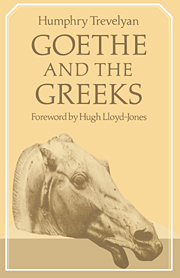CHAPTER V - FULL CLASSICISM: 1788–1805
Published online by Cambridge University Press: 15 December 2009
Summary
Beim erneuerten Studium Homers empfinde ich erst ganz, welches unnennbare Unheil der jüdische Prass uns zugefügt hat. Hätten wir die Sodomitereien und ägyptisch-babylonischen Grillen nie kennen lernen, und wäre Homer unsere Bibel geblieben, welch' eine ganz andere Gestalt würde die Menschheit dadurch gewonnen haben.
BACK IN WEIMAR
When Goethe returned to Weimar in June 1788, and settled down to a new life in the old surroundings, he believed that he had found in Italy the secret of Greek supremacy in art and in living. In Naples and Sicily he had seen the conditions of climate and land which had made the Greek man possible. In the Italian character he had caught glimpses of this Greek man, but they had been fleeting and unsatisfying. In Homer then, re–read in Sicily, he had found the picture for which he was searching: man as God conceived him, developing with instinctive rightness all his faculties to their allotted perfection. This “Urmensch” lived in harmony with Nature, however much he might have to battle with her in many of her manifestations. He did not ask that life should be other than what it was. Thus, at peace with God, he was granted exceptional revelations of ultimate truth, and, with the sure instinct of his nature, found the simplest means of giving artistic expression to these revelations, by faithful reproduction of the God–filled world around him.
- Type
- Chapter
- Information
- Goethe and the Greeks , pp. 179 - 262Publisher: Cambridge University PressPrint publication year: 1981



